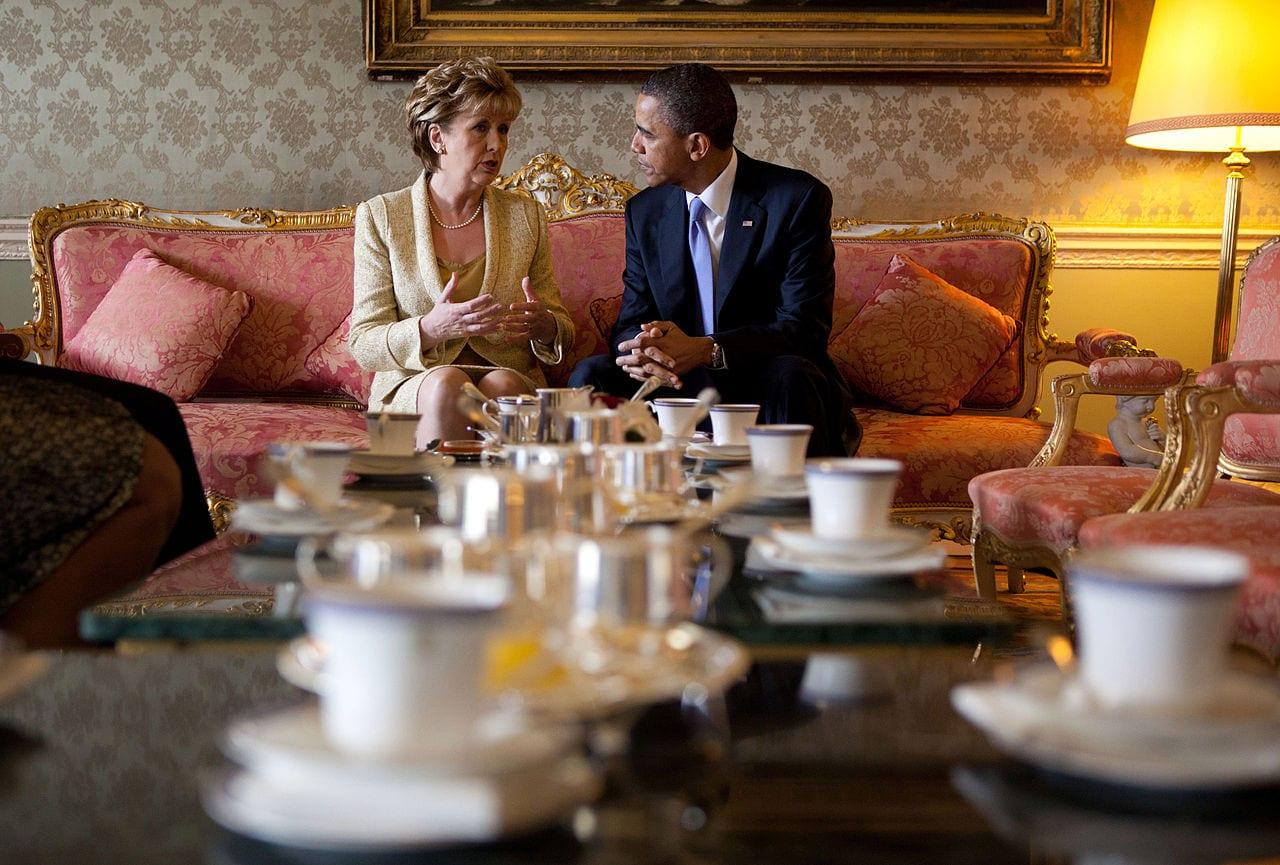LEICESTER, United Kingdom – Mary McAleese, the former president of Ireland, said only Pope Francis can change the Catholic Church’s teaching on homosexuality, which she said “is, in my view, evil.”
The former president was speaking at the centenary celebration for the Columban Missionaries on Friday, a day before participating in Dublin’s Pride Parade with her gay son.
“It [the Church’s teaching against homosexual acts] conduces to homophobia; homophobia is evil. It ruins people’s lives. It has ruined families’ lives. It has caused people to commit suicide. It has caused people to live in dark shadows,” she said in a public discussion with the Irish Times’s Joe Humphreys, at the Columban headquarters in Dalgan Park.
McAleese brought up the example of her son, who is now in a same-sex marriage, who “loved the Church…that same Church has a view of him that is inimical to the way God made him.”
RELATED: Citing workplace equality, Irish Prime Minister gives support to women’s ordination
She said the Church’s actions towards the gay community was “un-Christian,” adding “the only person who can actually stop that…is the pope.”
“He is the pope; he is completely in control. The pope has full primatial powers,” McAleese continued.
“This is a pope who has said from day one that he is never going to change doctrine … I have a problem with him even saying that. It’s a bit like a judge going into court and saying anybody who comes before me on a case of theft I’m going to sentence them all to 15 years in prison … that is trammeling on his own discretion. A judge wouldn’t be allowed to do that,” said the former president.
In February, McAleese – who served in the largely ceremonial role of president from 1997-2011 –was scheduled to speak in the Vatican at an event sponsored by Voices of Faith, but Irish-born American Cardinal Kevin Farrell – the head of the Vatican’s Dicastery for Laity, Family, and Life – vetoed her appearance.
RELATED: Former Irish president barred from speaking at Vatican
The organizers of the event – which had taken place annually in the Vatican since 2014 – moved the event to the nearby Jesuit headquarters, and asked McAleese to become the keynote speaker.
McAleese, speaking at a We Are Church event at Gonzaga College in Dublin June 16, said she had voted Yes in the May 25 referendum that removed pro-life protections for the unborn from the Irish constitution, despite holding pro-life positions earlier in her career. She also said her vote was “not a sin,” in reference to a bishop’s remarks that Catholics who voted Yes needed to go to confession.
Just days later, in an interview with the Irish Times, McAleese caused controversy by saying the Church is creating “infant conscripts who are held to lifelong obligations of obedience” when it baptizes babies.
RELATED: Ex-president of Ireland says baptism creates “infant conscripts”
During her Q&A on Friday, McAleese clarified her remarks.
“I think it is a very beautiful thing. All my children and grandchildren have been infant baptized. But it is mandatory in our Church. You must have them baptized as soon as possible after birth,” she said.
However, she said the problem was that “on the day we are baptized, not only do we have that theological gift of the grace of Christ, we also become members of the Catholic Church and members have rights and many obligations.”
“Among those obligations is obedience to the magisterium. We have very limited rights to free speech. We don’t have complete right to dissent. Those rights are narrowed by essentially man-made laws, and it is the man-made laws that worry me because these are imposed on children when they are two weeks or two months old and then when they get to seven or fourteen we say, you are bound by this,” McAleese – who has a canon law degree from Rome’s Pontifical Gregorian University – continued.
“I think they are entitled to say, ‘Who bound me?’ We treat them like people who have agreed openly and freely and voluntarily and personally to embrace the faith,” she said.
The former president said she would not directly comment on the dispute between Archbishop of Dublin Diarmuid Martin and the Irish Minister for Culture Josepha Madigan over women’s ordination.
She did say Francis was “a disappointment in relation to women,” and that the Church is “so far behind the curve [on the issue] it is embarrassing.”
“I mean he is no different to any other pope on women. A few more appointments, but really? Seriously? They increased visibility, not voice. And they’re not going anywhere,” said McAleese.
However, she did praise the pontiff for allowing more debate within the Church.
“These are debates that we didn’t have under Benedict, and we didn’t have them under John Paul, but we have them now and the Church has become very boisterous and rowdy and noisy and even belligerent at times under Francis,” she explained.
This year is the first time McAleese attended the Pride parade in Dublin, which had the theme ‘We Are Family’, a reference to the Aug. 22-26 World Meeting of Families taking place in Dublin.
She said last month she would not attend the Vatican-sponsored event – which will bring Francis to Dublin Aug. 25-26 – calling it a “political rally” for the “reinforcement of orthodoxy.”















